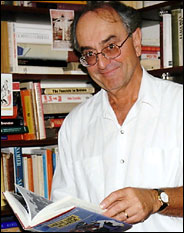 Source of book cover image: http://www.upjohninst.org/publications/titles/lo.html
Source of book cover image: http://www.upjohninst.org/publications/titles/lo.html
(p. C3) It is well known that doctors, dentists, and lawyers must be licensed to practice their professions. But what about occupational therapists, manicurists and barbers? How about fortune tellers, massage therapists, shampoo assistants, librarians, beekeepers, electrologists and movie projector operators? These are just a sampling of the hundreds of occupations that require a license in at least some states or counties.
In a new book, “Licensing Occupations: Ensuring Quality or Restricting Competition?” (Upjohn Institute, 2006), Morris M. Kleiner, an economist at the University of Minnesota, questions whether occupational licensing has gone too far. He provides much evidence that the balance of occupational licensing has shifted away from protecting consumers and toward limiting the supply of workers in various professions. A result is that services provided by licensed workers are more expensive than necessary and that quality is not noticeably affected.
. . .
Several studies have examined the effect of license requirements on performance in occupations like dentists and teachers. In one study, Professor Kleiner and a colleague, Robert T. Kudrle, found that stricter state licensing requirements for dentists did not noticeably affect the dental health of 464 Air Force recruits. Other studies have found at best weak evidence that students in classes taught by licensed teachers performed better than those taught by unlicensed teachers.
Summarizing the literature, Professor Kleiner concludes, “there is little to show that occupational regulation has a major effect on the quality of service received by consumers.”
At the same time, the hurdles imposed by occupational licensing reduce the supply of workers in many regulated professions, which drives up wages in those jobs and the price of services. Dentists, for example, were found to earn and charge 11 percent more in states with the most restrictive licensing requirements. While tough licensing standards may help higher-income consumers avoid low-quality providers, it also appears to prevent lower-income consumers from gaining access to some services.
For the full commentary, see:
Krueger, Alan B. “Economic Scene; Do You Need a License to Earn a Living? You Might Be Surprised at the Answer.” The New York Times (Thurs., March 2, 2006): C3.
(Note: ellipsis added.)
You want more evidence? OK, here’s more evidence:
(p. A20) BISMARCK, N.D., Oct. 10 (AP) – The State of North Dakota is exploring whether people who sell items on eBay for others must get standrd auctioneers’ licenses, a process that includes taking instruction in talking real fast.
To get a license in the stare, aplicants must pay a $35 fee, obtain a $5,000 bond and undergo training at one of eight approved auction schools, where the curriculum includes rapid-fie speaking, breathing control and reading hand gestures.
“I don’t think it offers any additional protection for the consumer,” said Mark Nichols, who runs a small consignment store in Crosby. “It just creates a lot of red tape for the business, as well as having to put out a lot of money.”
For the full story, see:
“North Dakota Weighs Auction License for Some eBay Sellers.” The New York Times (Tues., Oct. 11, 2005): A20.
For Kleiner’s book, see:
Morris M. Kleiner. Licensing Occupations: Ensuring Quality or Restricting Competition? Upjohn Institute, 2006.




 R.J.B. Bosworth. Source of image: NYT book review quoted and cited above.
R.J.B. Bosworth. Source of image: NYT book review quoted and cited above. 

